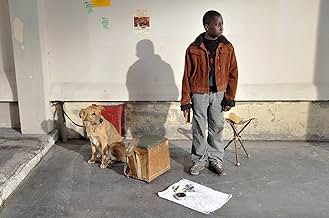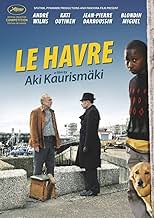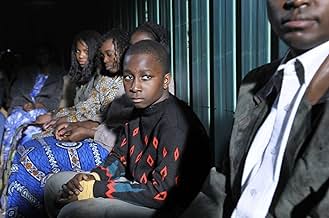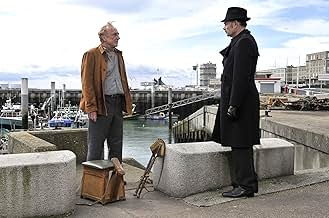IMDb-BEWERTUNG
7,2/10
24.753
IHRE BEWERTUNG
Als ein afrikanischer Junge mit einem Frachtschiff die Hafenstadt Le Havre erreicht, bekommt ein alternder Schuhputzer Mitleid und nimmt das Kind in seinem Haus auf.Als ein afrikanischer Junge mit einem Frachtschiff die Hafenstadt Le Havre erreicht, bekommt ein alternder Schuhputzer Mitleid und nimmt das Kind in seinem Haus auf.Als ein afrikanischer Junge mit einem Frachtschiff die Hafenstadt Le Havre erreicht, bekommt ein alternder Schuhputzer Mitleid und nimmt das Kind in seinem Haus auf.
- Regie
- Drehbuch
- Hauptbesetzung
- Auszeichnungen
- 15 Gewinne & 34 Nominierungen insgesamt
Quoc Dung Nguyen
- Chang
- (as Quoc-Dung Nguyen)
Little Bob
- Little Bob
- (as Roberto Piazza)
Empfohlene Bewertungen
Great. Very stylistic in its cinematography and lighting. Condensed and to the bone in its storytelling and editing.
Nice and subtle humour on the background of a highly contemporary story about our unbalanced globe, the hope for freedom and the power of human compassion.
I Truly enjoyed watching a film in which every scene is so carefully and skillfully arranged. This is Kaurismäki at his best working with a great cast and a script stripped of any unnecessary dialogue. The colors and the settings are stunning. There's always a risk that movies like this would come across as to polished or constructed, but from my point of view Kaurismäki strikes a great balance and makes sure that every image adds layers and details to the story.
Nice and subtle humour on the background of a highly contemporary story about our unbalanced globe, the hope for freedom and the power of human compassion.
I Truly enjoyed watching a film in which every scene is so carefully and skillfully arranged. This is Kaurismäki at his best working with a great cast and a script stripped of any unnecessary dialogue. The colors and the settings are stunning. There's always a risk that movies like this would come across as to polished or constructed, but from my point of view Kaurismäki strikes a great balance and makes sure that every image adds layers and details to the story.
This was one of the most visually stunning films I've ever seen. You could pause very nearly every shot and use it as screensaver or make a large print of it; that's how beautiful and well thought out they are.
Aki Kaurismäki evokes a sense of times past. He embraces the 'unreality' of his film, and the genre as a whole, and plays it up with great wit and art. As mentioned by previous reviews, he combines tragedy and comedy seamlessly into an extremely enjoyable and engaging film that doesn't try to pass itself off as life and as such engages on much deeper levels than its straightforward message or story would perhaps imply.
There are so many small details and well-thought out quirks here that keep your attention that it easily accommodates for my internet fried attention span, even while the director chooses not to openly deal with the electronic world. It's a decision indicative of the thoughtful and unique approach to the film; it aids both the storyline and the viewer's experience immensely. I was grateful and relieved to be taken away into a simpler and more honest world; both in the film's outward image, and within the story's universe. Its worth emphasising; this film doesn't try to masquerade as real life and as such allows for a much purer enjoyment. You don't have to worry about checking your expectations once the end credits roll.
Being beautifully shot may not have kept my attention for an hour and half, but the storyline and Kaurismäki's wit certainly did.
Aki Kaurismäki evokes a sense of times past. He embraces the 'unreality' of his film, and the genre as a whole, and plays it up with great wit and art. As mentioned by previous reviews, he combines tragedy and comedy seamlessly into an extremely enjoyable and engaging film that doesn't try to pass itself off as life and as such engages on much deeper levels than its straightforward message or story would perhaps imply.
There are so many small details and well-thought out quirks here that keep your attention that it easily accommodates for my internet fried attention span, even while the director chooses not to openly deal with the electronic world. It's a decision indicative of the thoughtful and unique approach to the film; it aids both the storyline and the viewer's experience immensely. I was grateful and relieved to be taken away into a simpler and more honest world; both in the film's outward image, and within the story's universe. Its worth emphasising; this film doesn't try to masquerade as real life and as such allows for a much purer enjoyment. You don't have to worry about checking your expectations once the end credits roll.
Being beautifully shot may not have kept my attention for an hour and half, but the storyline and Kaurismäki's wit certainly did.
This is a sweet, lightly intoxicating thing like a small glass of calvados under the wisteria in the evening. Kaurismaki has aged and his outcast and misfit characters aged with him, the quirks mellowed, the ferocious smoking toned down, the lines in the sometimes quietly astonished stone faces deeper, wearier, but imbued with almost ascetic serenity.
Some viewers have complained, why trivialize an actual problem in the manner of a fairy tale? A fair complaint for a problem perhaps more pressing than ever, especially in France and especially these days, with Sarkozi's desperate attempt to shore up votes for what looks like near-certain defeat in the upcoming elections by reverting to reactionary rhetorics from the far-right.
No, I believe the fairy-tale is the point. The idyllic neighborhood. The mannered caricatures of French people, with even the poorest having the time and fine sense of taste to leisurely enjoy their freshly baked baguette or glass of wine. The miraculous turn of events, explicitly acknowledged in the finale where kindness of this world is so overwhelming it even cures sickness. How could anyone miss this?
But a certain emptiness has always been of the essence for Kaurismaki, deliberate, designed emptiness.
The world is always flat to that effect, two-dimensional. The characters lack any conventional depth to speak of and do not really grow or learn lessons. By contrast, the plots of the films often exhibit a life of spontaneous motion, the objectives intentionally abstract, journeys across town, to America, in search of coffee and cigarettes. Motion for the sheer musical capacity of life to fill the quiet, the room in the heart to do so.
So it is always a variation of transient worlds centered in the stillness of the present moment that Kaurismaki has studied and consistently delivered. What is so remarkable is that he achieves this without any layering whatsoever, as a single flow.
This is his most Japanese film to date, even more concentrated flow than usual. Which is to say artificial nature that does not attempt to pass for the real thing but instead is empty space cultivated for beauty, a road-map for inner heart.
(I saw this together with the recent viral video KONY2012 and the contrast was amazing: that one, shameless artifice passing as nature, as truth, the real thing, contriving to motivate awareness several years after the fact and by selling merchandise, but was in truth both misinformed and morally dubious and even perhaps unwittingly manipulated agitprop in the service of shady foreign policy, while this one is simple, crisp, gracefully moral work, that does create awareness without any agendas.)
So it is very much the point that no one in the film is shown to wallow in misery, and most of the characters we meet would have plenty of reason to do so. Instead they enjoy this drink or meal together, whatever is at hand. And act with no complaint in the present moment to do what needs to be done. There is no meddlesome thought or proud ego to cloud the mind from the day's work, be it polishing shoes or helping out an immigrant kid.
This is the beauty of the thing: an idyll embedded with the purity of soul that gives rise to it and clear images only possible because of this cloudless eye.
The parting image is of a blossomed cherry tree gently rocking in the breeze, among the most traditionally Japanese images.
It encapsulates motion in stillness. The song of Zen.
Some viewers have complained, why trivialize an actual problem in the manner of a fairy tale? A fair complaint for a problem perhaps more pressing than ever, especially in France and especially these days, with Sarkozi's desperate attempt to shore up votes for what looks like near-certain defeat in the upcoming elections by reverting to reactionary rhetorics from the far-right.
No, I believe the fairy-tale is the point. The idyllic neighborhood. The mannered caricatures of French people, with even the poorest having the time and fine sense of taste to leisurely enjoy their freshly baked baguette or glass of wine. The miraculous turn of events, explicitly acknowledged in the finale where kindness of this world is so overwhelming it even cures sickness. How could anyone miss this?
But a certain emptiness has always been of the essence for Kaurismaki, deliberate, designed emptiness.
The world is always flat to that effect, two-dimensional. The characters lack any conventional depth to speak of and do not really grow or learn lessons. By contrast, the plots of the films often exhibit a life of spontaneous motion, the objectives intentionally abstract, journeys across town, to America, in search of coffee and cigarettes. Motion for the sheer musical capacity of life to fill the quiet, the room in the heart to do so.
So it is always a variation of transient worlds centered in the stillness of the present moment that Kaurismaki has studied and consistently delivered. What is so remarkable is that he achieves this without any layering whatsoever, as a single flow.
This is his most Japanese film to date, even more concentrated flow than usual. Which is to say artificial nature that does not attempt to pass for the real thing but instead is empty space cultivated for beauty, a road-map for inner heart.
(I saw this together with the recent viral video KONY2012 and the contrast was amazing: that one, shameless artifice passing as nature, as truth, the real thing, contriving to motivate awareness several years after the fact and by selling merchandise, but was in truth both misinformed and morally dubious and even perhaps unwittingly manipulated agitprop in the service of shady foreign policy, while this one is simple, crisp, gracefully moral work, that does create awareness without any agendas.)
So it is very much the point that no one in the film is shown to wallow in misery, and most of the characters we meet would have plenty of reason to do so. Instead they enjoy this drink or meal together, whatever is at hand. And act with no complaint in the present moment to do what needs to be done. There is no meddlesome thought or proud ego to cloud the mind from the day's work, be it polishing shoes or helping out an immigrant kid.
This is the beauty of the thing: an idyll embedded with the purity of soul that gives rise to it and clear images only possible because of this cloudless eye.
The parting image is of a blossomed cherry tree gently rocking in the breeze, among the most traditionally Japanese images.
It encapsulates motion in stillness. The song of Zen.
The natural flowing of this simple movie, where no excesses are to be noticed ,may make one judge it as a weird movie, where something actually happens, but does seem to affect the lives of the characters. This is not properly true. Indeed, this is a simple movie, with no plot twists, no complications, but here does it lie its magic. It's a movie where "normal", common people simply accept their lives for what they are, which does not mean in a passive way, on the contrary they prove morally resilient people, who relate one another in an authentic way, behave as honest and fair people (so difficult to find people like these nowadays, that they look so strange!) they face bad things with dignity, and good things with no easy enthusiasm. Its best quality lies in the perfect and never clashing blend between hard facts (the hardships of immigrants, the theme of illness) and poetry, with a human faith in miracles which never sounds ridiculous or mystical: miracles happen simply because sometimes they may happen, and there's not even much to wonder at. There's such a placid attitude shown by the characters, very well interpreted by a good cast, that if the aim was to convey a calm and resilient acceptance of life, with its weird mixture of hardness and poetry, well, the aim has been successfully accomplished.
Like every fairy-tale, this film by Aki Kaurismaki is unbelievable, but this apparent fake doesn't hide a sad reality behind the good intentions of the simple people that help the illegal immigrant child to arrive finally to London, wherein we couldn't predict what kind of life waits for him. A slow rhythm, (some scenes seem like stills), and a brilliant and strong color that contribute to the atmosphere of unreality, the frustration to the normal expectations of the viewers that are carried to imagine the worst, and receive on the contrary the sudden impact of the best, don't prevent to bring to the conscience the images of the cruel world that surrounds the miracle of solidarity that saves, perhaps momentarily, just one of the hundred persecuted. The bad and the good boys are generally discovered by the camera, which leaves, significantly, in off the figure of the pitiless chief of policy, and introduces in darkness the figure of the denouncer. Le Havre is an optimist movie with a very dubious happy end.
Wusstest du schon
- WissenswertesThe character Marcel Marx, played by André Wilms, first appears in Das Leben der Boheme (1992). Jean-Pierre Léaud also appears in both films, but as different characters.
- Zitate
Marcel Marx: L'argent circule au crepuscule.
- VerbindungenFeatured in At the Movies: Cannes Film Festival 2011 (2011)
- SoundtracksMatelot
Performed by The Renegades
Top-Auswahl
Melde dich zum Bewerten an und greife auf die Watchlist für personalisierte Empfehlungen zu.
- How long is Le Havre?Powered by Alexa
Details
Box Office
- Budget
- 3.850.000 € (geschätzt)
- Bruttoertrag in den USA und Kanada
- 611.709 $
- Eröffnungswochenende in den USA und in Kanada
- 26.363 $
- 23. Okt. 2011
- Weltweiter Bruttoertrag
- 12.959.706 $
- Laufzeit
- 1 Std. 33 Min.(93 min)
- Farbe
- Seitenverhältnis
- 1.85 : 1
Zu dieser Seite beitragen
Bearbeitung vorschlagen oder fehlenden Inhalt hinzufügen





























